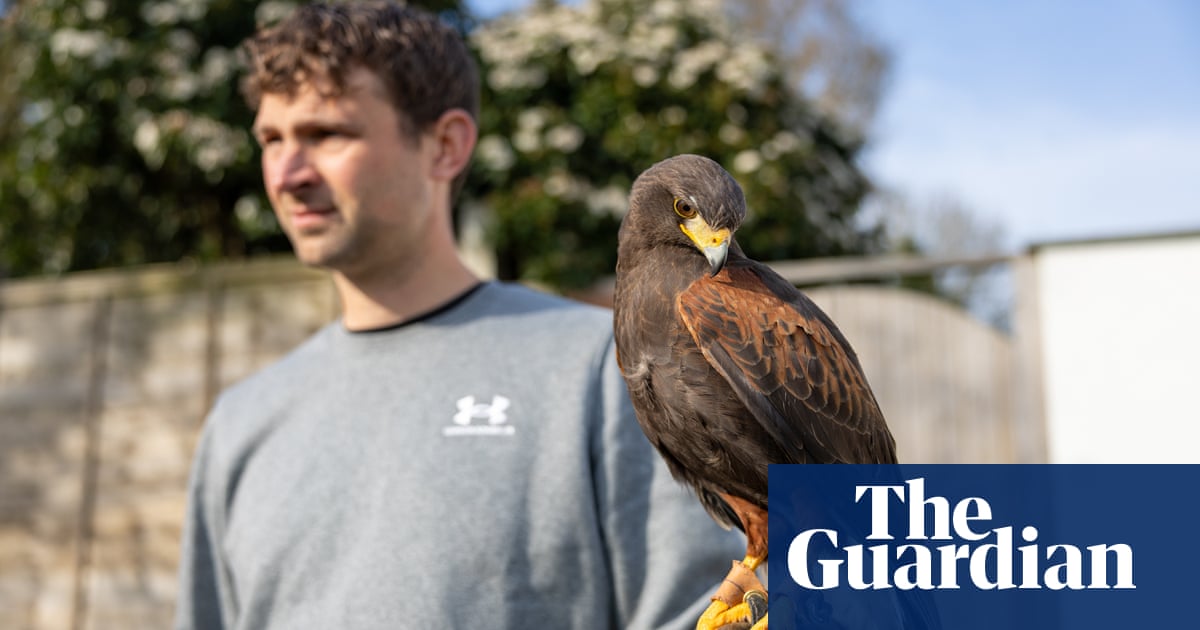Chibuike Ekeiwu is no bruiser. He is not particularly tall or musclebound, has a friendly face and talks in an intelligent, calm manner. Chibs, as he is known, is also a patient man with an ability to defuse tension, which can frustrate the prisoners he works with at HMP Maidstone, a category C prison in Kent.
Ekeiwu leaves the shared Victorian terrace house he lives in at dawn and drives across town bathed in the yellow light of the street lamps.
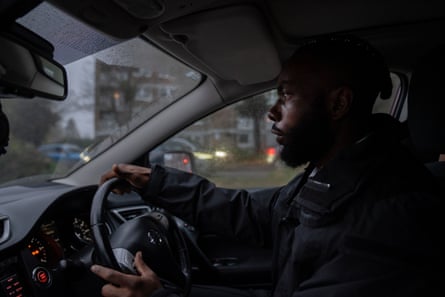
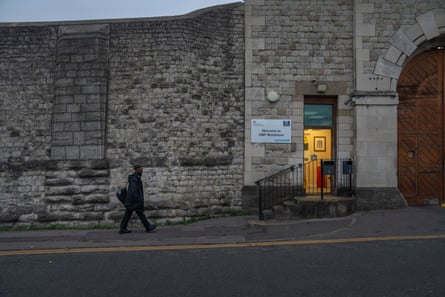
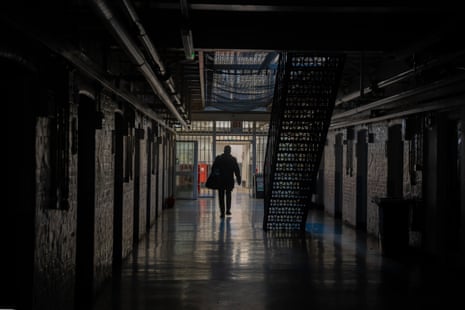
-
Ekeiwu drives to the prison and walks the last 50 metres to the staff entrance before making his way to the Kent House wing
Arriving at the prison, he is greeted by smiles and jocular comments about the photographer who is spending the day with him. (I am here under the strict understanding that no prisoners are identifiable in any of my photographs.) Ekeiwu smiles back and puts personal items away and swaps them for the tools of his trade, while I hand in my phone, saying goodbye to the outside world.
Ekeiwu eventually arrives on the Kent House wing of the prison, which is still quiet and dark before the morning unlock.
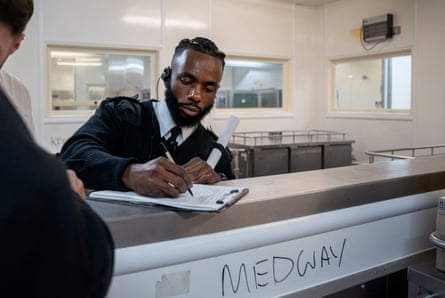
-
Ekeiwu signs for a kitchen delivery (above) and supervises the recycling (below)
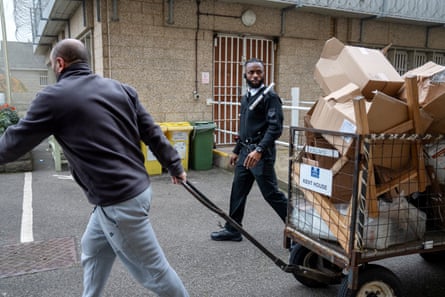

Noise builds and prisoners appear from their cells as the morning unlock gets under way. Some of the inmates are well groomed and bright while others look bleary eyed and sullen. Many greet Ekeiwu with a smile and a welcome, seeming, on the surface at least, genuinely pleased to see him. I say on the surface because later in the day they may be goading and provoking him due to something they are unhappy about. When locked away in prison, a seemingly small problem can take on huge proportions and it can consume a person’s mind, and then the tension rises.
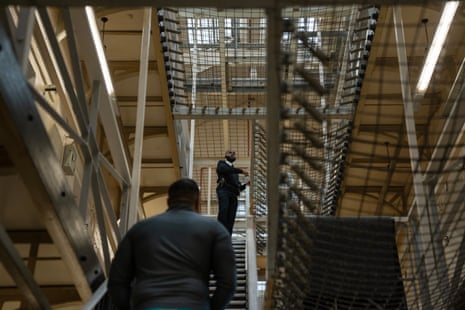
-
Ekeiwu keeps a sharp eye out for anything suspicious
As prisoners emerge into the grey light of the exercise yard, some talk to Ekeiwu (“Hey, who’s the cameraman?”; “Take my picture”; “Don’t take mine”), while others meander to far corners and chat. Two men walk out holding slices of white bread that they break into pieces and throw to the pigeons that come and go as they please. The two men watch them as they peck at the bread, before the birds fly up to the roof of the wing with a view of the River Medway that flows through the town.
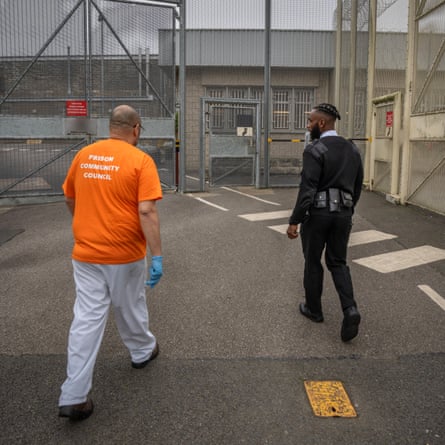
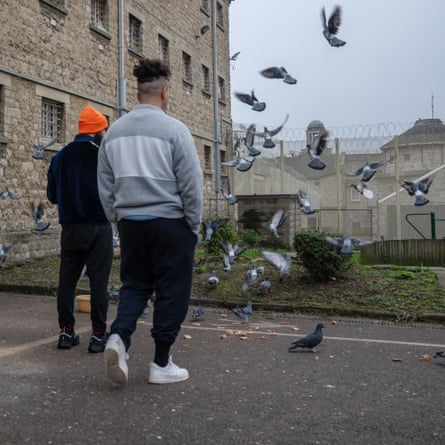
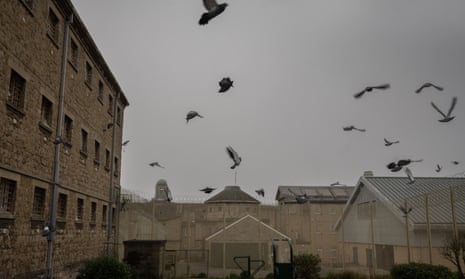
-
Some prisoners feed pigeons, which must seem like a symbol of freedom as they fly over the prison wall
In the yard as the cold morning progresses, Ekeiwu begins searching prisoners who need to go to different parts of the prison to fulfil jobs or have gym sessions. Prisoners who don’t have such engagements slowly make their way to their small cells, some with a smile and a chat, others without complaint but with a sense of resignation.
Ekeiwu’s job now is to oversee certain prisoners’ work, including cleaning. One prisoner, a slight but intense man with sharp eyes under a woolly hat, angrily confronts Ekeiwu. “He does this a lot,” says Ekeiwu, “comes at me with high tension, but I respond with much lower tension, that calms him in the end.
“Some small thing may have annoyed him or maybe he is doing this because you are here with a camera.”
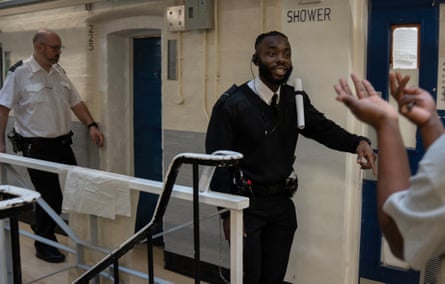
-
Ekeiwu calms a prisoner who is remonstrating about his duties
The morning progresses with only small pockets of boisterous noise now and again. Then, as a lunch of hard boiled eggs and salad is being served, a very quiet undercurrent of tension, unseen and unheard by prisoners, moves through the staff. Some including Ekeiwu move into a small locked office on the wing to discuss what is happening.
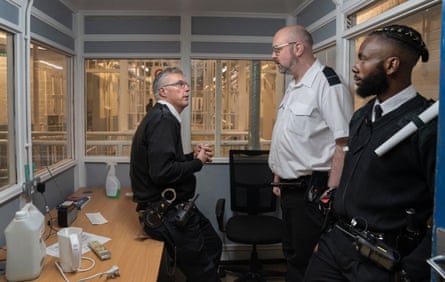
-
The supervising officer Simon Knell, prison officer Jon Allchia and Ekeiwu have a meeting as tension mounts after a prisoner is found to have a mobile phone
A smuggled mobile phone has been found in a prisoner’s cell. It has been used for communication with someone on the outside to arrange for a package to be thrown over the prison walls. The prisoner is quietly removed from the wing and the package is seized. Calm is restored among wing staff, for now.
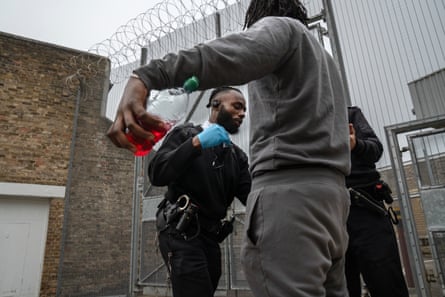
-
Ekeiwu searches random prisoners as they leave for jobs or organised exercise
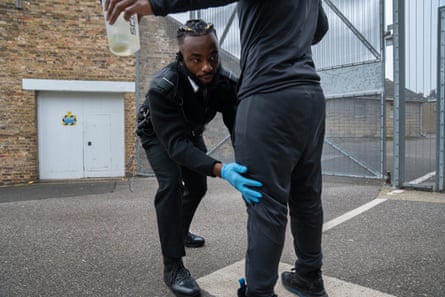
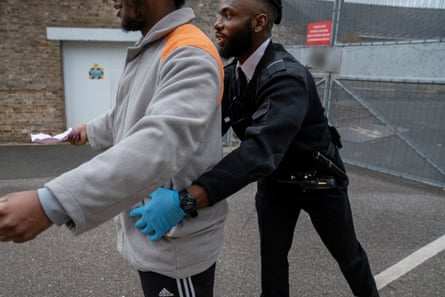
This kind of thing is part of what one prison officer calls the “cat and mouse” game that staff often have to play, looking calm and content on the outside but inside being constantly on their guard, utilising not a sixth sense but what they call their “prison sense”. Ekeiwu and his colleagues are constantly relying on a mixture of patience, toughness, intelligence, experience and sometimes friendliness.
Prison is a strange place, somewhere that is full of human interest, tension, atmosphere, routine, punishment, survival, hope and even inspiration. Elements that always exist when different people are thrown together in a confined space. It sometimes puts you in mind of an odd type of boarding school or barracks, at times comradely, often edgy, but always great to leave.
The afternoon draws to its close after another meal. The prisoner with the piercing eyes and the woolly hat has another dig at Ekeiwu, which again he defuses, and then it’s time for evening lockup.
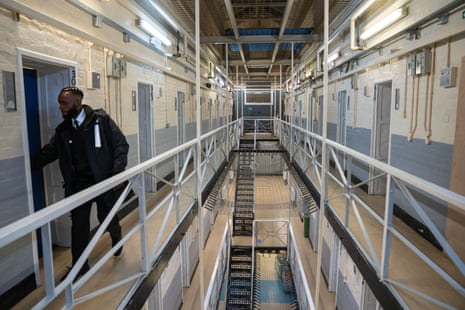
-
The evening lockup
After a quick search of one cell, Ekeiwu works his way along the others on his given landing, and with a general air of cordiality and resignation the prisoners move into their own cells, one or two savouring the last moment of relative freedom on the landing before Ekeiwu reaches their door. Only one proves momentarily combative and remonstrates about his daily duties before once again the Chibs effect calms the situation and the door closes behind him. The landing is now quiet, with an unfinished game of dominoes resting on a small table and a Bible placed in a wall recess.
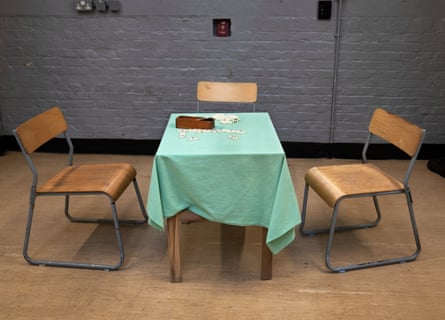
-
An unfinished game of dominoes
I leave with Ekeiwu, once again in the darkness, as he retraces his way back through the endless doors and gates. At the exit he picks up his things and I my phone, back to news of the Middle East and Donald Trump.

-
At 7.30pm, the prison day comes to an end for Ekeiwu
Arriving back at his kitchen where house sharers drop in and out, there is just time for a change of clothes and a cup of tea before Ekeiwu is out again. He travels across Maidstone to a local football ground where he meets colleagues and friends to play football, a sport he played to a high level when he was younger. He now plays every week, often to raise money for local charities.
Prison life is not for everyone, I think to myself, and I ask Ekeiwu why he does it. “You are part fireman, part councillor, part psychologist and often a role model,” he says. Looking out of the steamed-up windows of his car before saying goodbye, I ask Ekeiwu what is the best thing about his work.

-
Ekeiwu arrives home and enjoys a quick cup of tea
“I always think about a certain young prisoner on the wing some time back. He was at rock bottom, isolated, not engaged. But I saw something in him and we worked with him and helped him. He did have some education and he ended up as chair of the prisoners’ council before being released to a cat D prison. That was progress.”

.png) 2 months ago
26
2 months ago
26



















